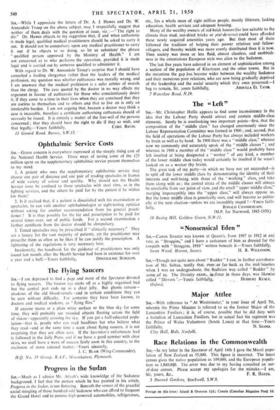Progress in the Sudan SIR, —Much as I admire Mr. Atiyah's
wide knowledge of the Sudanese background, I feel that the picture which he has painted in his article, Progress in the Sudan, is too flattering. Beneath the veneer of the graceful social mingling of those hundred-odd Sudanese who can afford to frequent the Grand Hotel and to possess high-powered automobiles, refrigerators, etc., lies a whole mass of eight million people, mostly illiterate, lacking education, health services and adequate housing.
Many of the wealthy owners of red-brick houses (far less suitable to the climate than mud, sun-dried bricks or pise-de-terre) could have afforded these newly acquired amenities years ago. But then most of them followed the tradition of helping their. poorer relatives and- fellow- villagers, and thereby wealth was more evenly distributed than it is now. Then society was more or less fluid, almost classless, and snobbish- ness in the ostentatious European style was alien to the Sudanese.
The last five years have ushered in an element of sophistication among a section of the population of Khartoum and the other towns. But in the meantime the gap has become wider between the wealthy. Sudanese and their numerous poor relations, who are now being gradually deprived of the leadership and the social security which they once possessed.—I






































 Previous page
Previous page